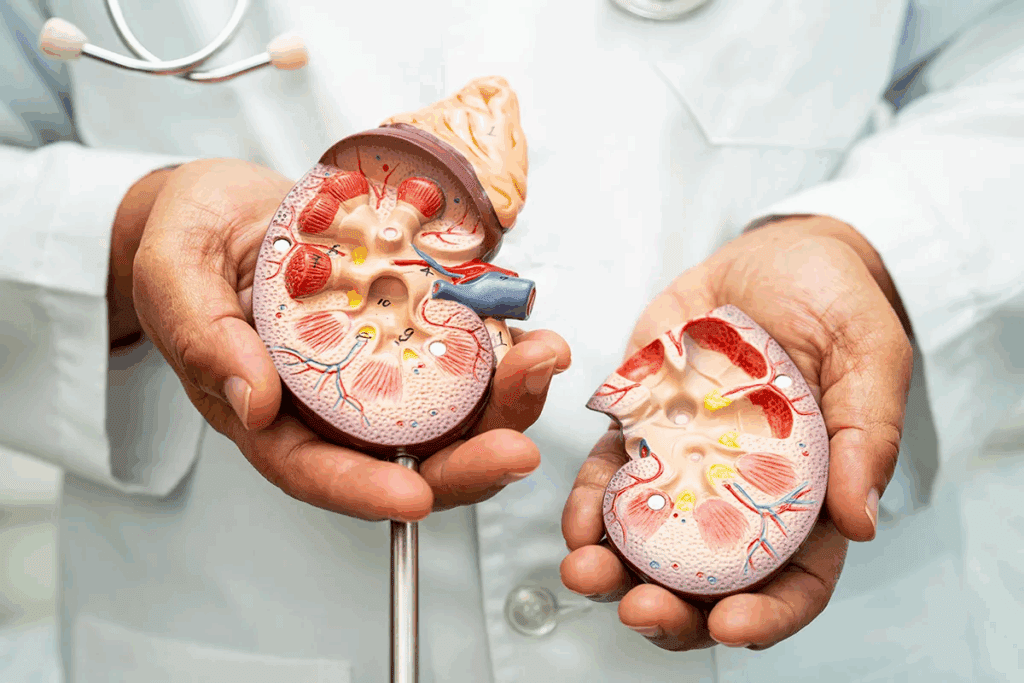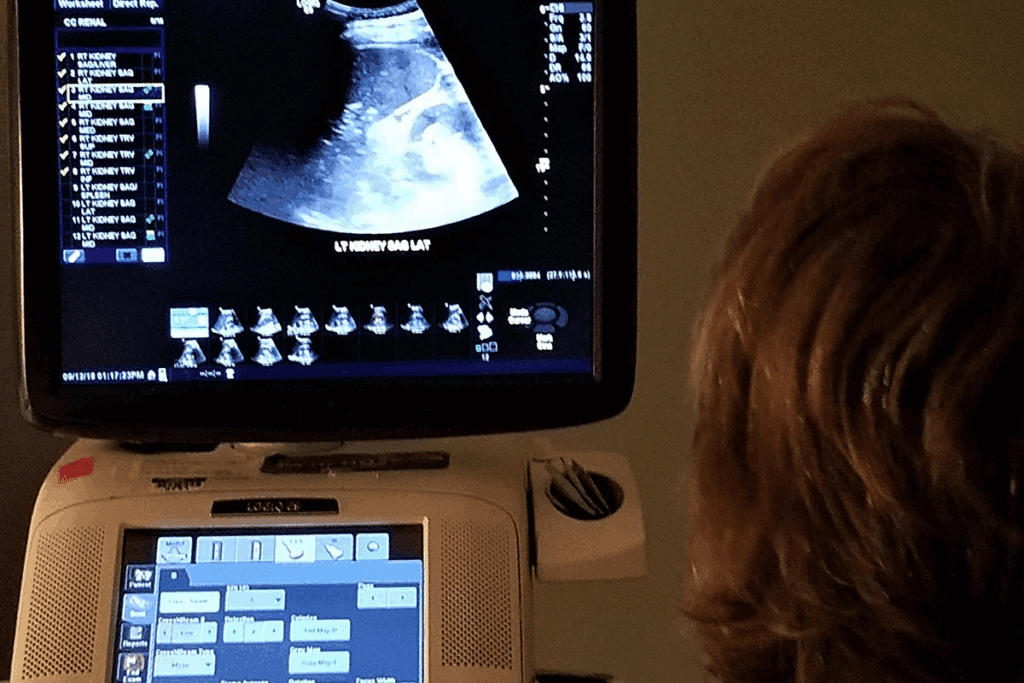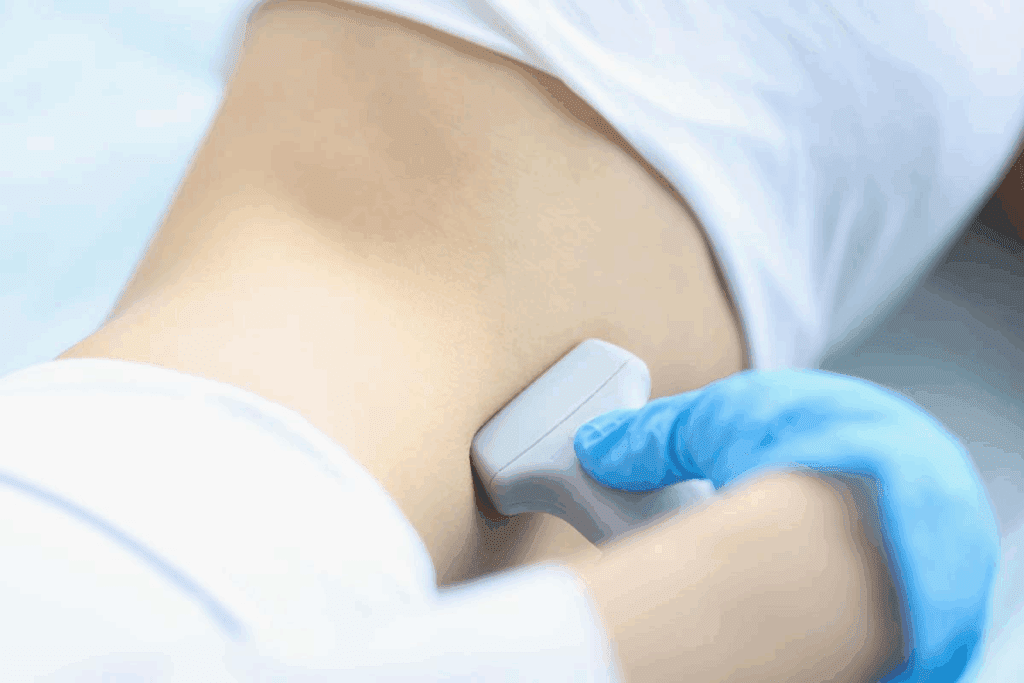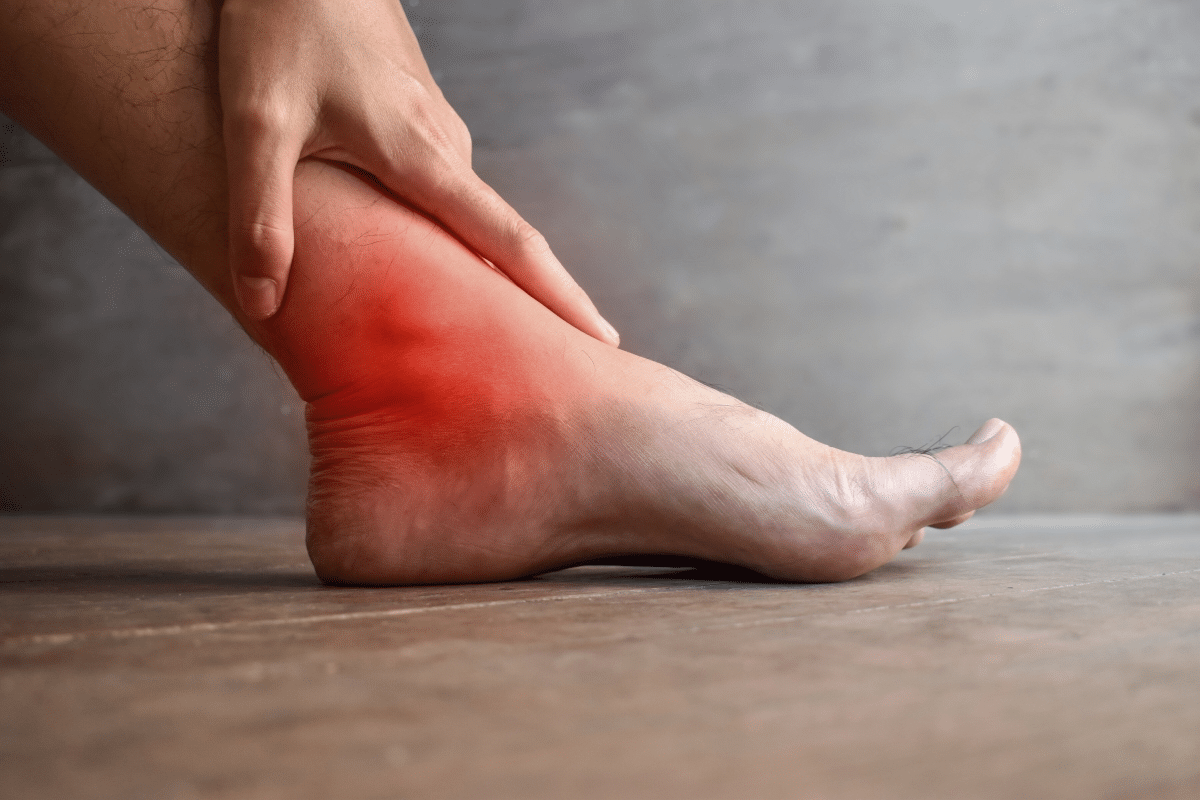
Chronic kidney disease affects over 35.5 million Americans, which is about 14% of adults. Diabetes and high blood pressure are the top reasons for this condition.
Our kidneys filter our blood all day, every day. But we often ignore their hard work. It’s key to know what harms our kidneys and how to keep them safe.
At Liv Hospital, we share proven tips to avoid serious problems like heart disease and stroke. Knowing the risks and acting early can greatly lower kidney damage.
Key Takeaways
- Chronic kidney disease is a big health problem in the U.S.
- Diabetes and high blood pressure lead to kidney disease.
- Our daily actions can harm our kidneys without us realizing it.
- Knowing what risks our kidneys face is vital for prevention.
- Keeping our kidneys healthy can stop serious issues.
The Silent Epidemic of Kidney Disease

Many people live with kidney disease without realizing it. This is because it often doesn’t show symptoms until it’s advanced. Kidney disease is a serious issue that can cause major health problems if not treated.
How Your Kidneys Function
Our kidneys are key to keeping us healthy. They filter out waste, extra fluids, and salts from our blood. They also help control blood pressure, make red blood cells, and balance calcium levels. Knowing how our kidneys work helps us understand the effects of kidney disease.
Warning Signs of Kidney Damage
Kidney disease can sneak up on you, but there are signs to watch for. Look out for changes in how you pee, swelling in your legs and feet, feeling really tired, and trouble focusing. Spotting these signs early can help manage the disease better.
Here are some key indicators of possible kidney problems:
| Symptom | Description |
| Changes in Urination | More frequent urination, or urination that is foamy or bubbly |
| Swelling | Swelling in the legs, ankles, feet, or face due to fluid retention |
| Fatigue | Persistent tiredness and lack of energy |
Spotting these symptoms early can greatly improve kidney health. If you notice any of these signs, it’s vital to see a doctor right away.
1. Diabetes: The Leading Cause of Kidney Failure

Diabetes is the top reason for kidney failure globally, making up about 45% of new cases. High blood sugar levels harm the kidneys’ filtering system. This makes it hard for the kidneys to clean the blood well.
How Diabetes Damages Kidney Function
Diabetes hurts the kidneys by damaging the nephrons. These tiny units filter waste from the blood. Over time, high glucose levels can scar and damage these structures, making them less effective.
Key mechanisms include:
- Advanced glycosylation end-products (AGEs) formation, which damages kidney cells
- Increased pressure within the glomeruli, the filtering units of the nephrons
- Inflammation and oxidative stress further damage kidney tissues
Prevention and Management Strategies
To lower the risk of diabetic kidney disease, managing blood sugar is key. This means making lifestyle changes and possibly taking medication.
Effective strategies include:
- Maintaining a healthy diet, low in sugars and unhealthy fats
- Engaging in regular physical activity to improve insulin sensitivity
- Monitoring blood glucose levels regularly to ensure they’re within target ranges
- Adhering to prescribed medication regimens to control diabetes
Regular Screening for Diabetic Kidney Disease
Regular screening is vital for catching diabetic kidney disease early. This includes urine tests for albumin and blood tests for kidney function.
Early detection allows for timely intervention, potentially slowing or halting disease progression. It’s important to work with healthcare providers to set up a screening plan. This plan should match your risk factors and health status.
2. Hypertension: Silent Pressure on Your Kidneys
High blood pressure, or hypertension, quietly harms your kidneys. It damages the tiny blood vessels inside them. This makes it hard for the kidneys to filter out waste and extra fluid.
Blood Pressure’s Impact on Kidney Blood Vessels
Hypertension hurts the blood vessels in the kidneys. This reduces their ability to work properly. The high pressure damages the nephrons, the kidney’s filtering units, causing scarring over time.
This scarring can lead to chronic kidney disease or even kidney failure if not treated.
The relationship between hypertension and kidney damage is bidirectional: high blood pressure can cause kidney disease. And kidney disease can also raise blood pressure, starting a cycle of harm.
Controlling Hypertension to Protect Kidney Health
It’s key to control high blood pressure to keep the kidneys healthy. Making healthy lifestyle choices can help. These include staying at a healthy weight, eating less sodium, exercising, and drinking less alcohol.
At times, medicine is needed to keep blood pressure in check.
“Controlling high blood pressure is key to slowing kidney disease and lowering the risk of problems.”
Recommended Blood Pressure Targets
The American Heart Association suggests keeping blood pressure under 130/80 mmHg for most adults. For those with kidney disease, the goal might be even lower, based on other health issues. It’s important to regularly check blood pressure and adjust treatment plans as needed.
Working closely with healthcare providers to manage high blood pressure and watch kidney health can greatly lower the risk of kidney damage and related issues.
3. Obesity and Metabolic Syndrome
Obesity and metabolic syndrome are big risks for kidney disease. They affect kidney health in many ways. This includes high blood pressure and diabetes, which harm the kidneys.
The Connection Between Weight and Kidney Health
Being overweight raises the risk of kidney disease. It does this by causing high blood pressure and diabetes. These conditions damage the kidneys.
Studies show that obese people face a higher risk of kidney disease. This is because obesity changes metabolism and blood pressure. These changes can harm kidney function over time.
Weight Management Strategies
Managing weight is key to avoiding kidney disease. Eating well and exercising regularly are important. A diet full of fruits, veggies, and whole grains is best.
Here are some tips for managing weight:
- Set achievable weight loss goals
- Do different physical activities every day
- Stay away from quick fixes and focus on lasting changes
- Watch your calorie intake and eat a balanced diet
Healthy Diet Patterns for Kidney Protection
A diet that protects the kidneys is full of nutrients and low in processed foods. It should include:
| Dietary Component | Benefit for Kidney Health |
| Fruits and Vegetables | Rich in antioxidants and fiber, helping to reduce inflammation |
| Whole Grains | Provides sustained energy and fiber, supporting overall health |
| Lean Proteins | Reduces strain on the kidneys compared to high-protein diets |
By living a healthy lifestyle, you can lower your risk of kidney disease. This includes eating well and staying active.
4. Tobacco Use and Smoking
Tobacco use harms the kidneys in many ways. Smoking is a big risk for kidney disease. Its effects on kidney health are huge.
Accelerating Kidney Damage
Smoking damages blood vessels, causing atherosclerosis. This reduces blood flow to the kidneys. It speeds up kidney damage and disease.
Smoking also raises blood pressure. This is another big risk for kidney disease. Tobacco chemicals directly harm kidney tissues, making kidney function worse.
Benefits of Quitting for Kidney Health
Quitting smoking greatly improves kidney health and overall health. A few years after quitting, heart disease and stroke risks drop. This helps kidney health, too.
Quitting also controls blood pressure, protecting the kidneys. Quitting smoking also improves mental and financial health. There are many resources to help you quit smoking for good.
Resources for Smoking Cessation
Many resources help people quit smoking. These include:
- Counseling services
- Nicotine replacement therapy (NRT)
- Prescription medications like bupropion and varenicline
- Support groups
- Mobile apps and online resources
Using these resources together boosts quitting chances. Healthcare providers can help find the best strategies for quitting.
5. Recurrent Urinary Tract Infections
Recurring urinary tract infections (UTIs) can harm the kidneys. It’s important to prevent and treat them effectively. Bacteria in the bladder can multiply, leading to UTIs. These infections can then move up to the kidneys, causing serious problems.
From UTI to Kidney Infection
UTIs happen when bacteria get into the urinary tract. If not treated quickly, they can move up to the kidneys. This can cause kidney infections, leading to scarring and possibly chronic kidney disease.
Prevention Strategies for Recurrent UTIs
Stopping UTIs from coming back is key to keeping the kidneys healthy. Here are some ways to do it:
- Drink lots of water to flush out bacteria
- Go to the bathroom when you need to, don’t hold it
- Keep clean by wiping from front to back
- Stay away from products that can irritate the area
Some people think cranberry juice might help prevent UTIs. But the evidence is not clear.
When to Seek Medical Attention
If you have symptoms of a UTI, like burning when you pee, you need to see a doctor. If you keep getting UTIs, talk to your doctor about preventive antibiotics or other treatments.
Knowing the risks and what can happen with UTIs can help you protect your kidneys. Taking action early can make a big difference.
| Risk Factors | Potential Consequences |
| Female gender | Increased risk of kidney infection |
| Sexual activity | Potential for recurrent infections |
| Urinary tract abnormalities | Increased risk of kidney damage |
UTIs that keep coming back are a big risk for kidney health. But by preventing and treating them, you can lower the risk of kidney damage. Understanding the causes and taking steps early can help protect your kidneys.
6. Kidney Stones and Their Complications
It’s important to know about kidney stones and their risks. These stones are hard deposits made of minerals and salts. They can cause a lot of pain and vomiting. If not treated, they can seriously harm your kidneys.
How Stones Form and Damage Kidneys
Kidney stones happen when there’s an imbalance in the urine. This imbalance can lead to the formation of stones. These stones can block urine flow, cause infections, or even lead to kidney failure.
Concentrated urine is a big risk for kidney stones. This happens when you don’t drink enough water. When urine is concentrated, minerals are more likely to form stones.
Dietary Changes to Prevent Stone Formation
What you eat can help prevent kidney stones. Making some changes in your diet can lower your risk. For example, eating less sodium and animal protein can help.
- Eat more citrate-rich foods like lemons and oranges. Citrate helps prevent stones.
- Limit foods high in oxalate, like spinach and beets, if you’re prone to calcium oxalate stones.
- Keep your calcium intake balanced. Too little or too much can increase your risk.
Hydration and Other Prevention Strategies
Drinking enough water is key to preventing kidney stones. Water helps dilute substances that can lead to stones. Aim for 8-10 glasses of water a day, more if you’re active or live in a hot place.
Other ways to prevent stones include:
- Stay at a healthy weight and manage conditions like high blood pressure and diabetes.
- Avoid too much vitamin C and certain medications that can raise your risk.
- See your doctor regularly to check your kidney health and adjust your prevention plan.
7. What Can Cause Damage to Your Kidneys: Medications and Substances
Certain medications and substances can harm our kidneys if not used properly. The kidneys filter waste and toxins from our blood. Harmful substances can make them work less well.
Over-the-Counter Pain Relievers (NSAIDs)
NSAIDs help with pain and inflammation. But, using them too much can hurt kidney tubules and lower kidney function. It’s key to follow the dosage and talk to a doctor before using NSAIDs for a long time.
Prescription Medications with Kidney Risks
Some prescription drugs, like antibiotics and blood pressure meds, can harm the kidneys. Below is a list of some and their risks:
| Medication Type | Potential Kidney Risk |
| Certain Antibiotics | Kidney damage or failure with prolonged use |
| Chemotherapy Drugs | Damage to kidney cells |
| High Blood Pressure Medications | Changes in kidney function or damage |
Alcohol and Recreational Drugs
Too much alcohol and recreational drugs can harm the kidneys. Alcohol can lead to dehydration and less blood flow to the kidneys. Some drugs can damage kidney cells or raise blood pressure, straining the kidneys.
It’s important to drink alcohol in moderation and avoid recreational drugs to keep the kidneys healthy.
Safe Medication Practices
To protect your kidneys, follow safe medication practices. This means:
- Always follow the dosage on the label.
- Check with a doctor before starting any new medication if you have kidney issues.
- Tell your doctor about all medications or supplements you’re taking to avoid bad interactions.
Being careful about what we put in our bodies can help avoid kidney damage. This keeps our kidneys working well.
8. Autoimmune Diseases and Inflammatory Conditions
Autoimmune diseases can harm our kidneys a lot. They happen when our immune system attacks our own body. This leads to inflammation and damage.
Common Autoimmune Diseases Affecting the Kidneys
Many autoimmune diseases can hurt our kidneys. Lupus is one, causing inflammation in the kidneys. This can damage them over time if not treated.
IgA Nephropathy, or Berger’s disease, also affects the kidneys. It damages the filtering system. Other diseases like Goodpasture’s syndrome and ANCA-associated vasculitis can also harm the kidneys.
Managing Autoimmune-Related Kidney Damage
Managing kidney damage from autoimmune diseases needs a detailed plan. Working with doctors is key to keeping an eye on kidney health. They might use corticosteroids or immunosuppressants to fight inflammation.
Changing your lifestyle is also important. Eating right, drinking plenty of water, and not smoking can help your kidneys.
Working with Specialists for Complete Care
Autoimmune diseases are complex, so seeing specialists is vital. Nephrologists and rheumatologists offer specific treatments. They know how to help your kidneys.
Getting care from many doctors is best. It makes sure all your health needs are met. This is key to managing autoimmune diseases and keeping your kidneys safe.
9. Chronic Dehydration and Poor Fluid Intake
Chronic dehydration can harm your kidneys. Drinking enough water is key to keeping them healthy. Our kidneys need water to work properly, helping to remove waste.
The Importance of Hydration for Kidney Function
Drinking enough water is essential for our kidneys. It helps them:
- Dilute waste products, making them easier to filter out
- Regulate body temperature
- Maintain blood pressure
- Support the transport of nutrients and oxygen to cells
Without enough water, our kidneys can get overworked. This can lead to toxins building up. It also raises the risk of kidney stones and infections.
Signs of Dehydration
Knowing the signs of dehydration is important. Common signs include:
- Dark yellow or amber-colored urine
- Fatigue or lethargy
- Dizziness or lightheadedness
- Dry mouth and throat
- Headaches
If you notice these symptoms, drink water often. It’s important to stay hydrated.
Optimal Fluid Intake Guidelines
How much water should we drink? The “8×8 rule” suggests eight 8-ounce glasses a day. But your needs can change based on your age, sex, weight, and activity level.
Watching your urine color is a good way to check if you’re drinking enough. If it’s pale yellow or clear, you’re likely hydrated. Listen to your body’s thirst signals too.
To stay hydrated and protect your kidneys, follow these tips:
- Drink water regularly throughout the day
- Monitor your urine color and output
- Adjust your fluid intake based on your activity level and climate
- Avoid sugary drinks that can have negative health effects
By focusing on hydration, you can protect your kidneys. This supports your overall health, too.
10. High-Sodium Diet and Excessive Protein Consumption
A high-sodium diet and too much protein can harm our kidneys. Our kidneys are key to our health, and what we eat affects them a lot.
Salt’s Impact on Kidney Function
Too much salt can cause high blood pressure, a big risk for kidney disease. High sodium levels make our body hold more fluid, raising blood pressure. This can damage the kidney blood vessels and lower their function.
To avoid this, we should eat less salt. The American Heart Association says to keep sodium under 2,300 milligrams a day. For most adults, the goal is 1,500 milligrams.
Protein Intake and Kidney Strain
Eating too much protein can make our kidneys work too hard. Our body breaks down protein into waste that the kidneys must filter. A diet rich in protein can strain our kidneys over time.
But we also need enough protein for health. The goal is to find a balance that keeps our kidneys healthy without missing out on nutrients.
Balanced Diet Recommendations for Kidney Health
Keeping a balanced diet is key to kidney health. We need to watch our sodium and protein intake. Here are some tips:
- Limit sodium to 2,300 milligrams a day.
- Choose fresh foods over processed ones.
- Balance protein with other nutrients.
- Drink plenty of water to stay hydrated.
| Food Item | Sodium Content (mg) | Protein Content (g) |
| Grilled Chicken Breast | 250 | 30 |
| Canned Black Beans | 400 | 15 |
| Processed Deli Meat | 1000 | 20 |
By watching what we eat and balancing sodium and protein, we can protect our kidneys. This helps lower the risk of kidney disease.
Conclusion: Protecting Your Kidney Health
Keeping your kidneys healthy is all about being aware and taking action. Knowing the risks and making smart choices can lower your chance of kidney disease. This helps keep you healthy overall.
We talked about things that can harm your kidneys, like diabetes, high blood pressure, being overweight, and some medicines. Knowing what damages the kidneys the most and what damages your kidneys is key to avoiding kidney disease. Simple steps, like eating right, drinking plenty of water, and not eating too much salt or protein, can help a lot.
It’s important to watch out for things to avoid for kidney health, like smoking, drinking too much alcohol, and some medicines without a doctor’s say-so. Regular health checks and screenings can catch problems early. This lets you take action fast.
By taking charge of your kidney health, you can lower your risk of kidney disease and its serious side effects. We urge you to make smart choices and live a healthier lifestyle. This will protect your kidneys and keep you feeling your best.
FAQ
What damages the kidneys the most?
Diabetes and high blood pressure are the main causes of kidney damage. Uncontrolled diabetes can harm the blood vessels in the kidneys. High blood pressure can strain the kidneys, causing damage over time.
How can I protect my kidneys from damage?
To keep your kidneys healthy, manage diabetes and blood pressure well. Stay hydrated and avoid too much salt and protein. Don’t smoke and limit NSAIDs and other harmful medications.
What are the warning signs of kidney damage?
Signs of kidney damage include changes in urination and swelling in the legs and feet. Fatigue and high blood pressure are also warning signs. If you notice these, see a healthcare professional for help.
Can certain medications harm my kidneys?
Yes, some medications like NSAIDs, antibiotics, and chemotherapy drugs can harm the kidneys. Always take the right dose and talk to your doctor about any risks.
How does obesity affect kidney health?
Obesity increases the risk of kidney disease. It’s linked to diabetes and high blood pressure, which harm the kidneys. Keeping a healthy weight through diet and exercise can protect your kidneys.
What is the impact of smoking on kidney health?
Smoking speeds up kidney damage and raises the risk of kidney disease. Quitting smoking greatly benefits your kidney health and overall health.
How can I prevent recurrent urinary tract infections (UTIs) that can lead to kidney damage?
To avoid UTIs, practice good hygiene and stay hydrated. Urinate after sex and consider preventive antibiotics. Talk to a healthcare provider for advice.
What dietary changes can help prevent kidney stones?
To prevent kidney stones, drink plenty of water and eat less salt. Follow a diet that suits your stone type. For calcium oxalate stones, limit foods high in oxalate.
How much fluid should I drink to stay hydrated and protect my kidneys?
Fluid needs vary by age, sex, activity level, and climate. Aim for at least 8 cups (64 ounces) of fluid daily. You might need more in certain situations.
Can a high-sodium diet affect my kidney health?
Yes, a high-sodium diet can raise blood pressure and strain the kidneys. Limit sodium to less than 2,300 milligrams daily to protect your kidneys.
How does excessive protein consumption impact kidney health?
Too much protein can strain the kidneys. While protein is important, balance your intake to keep your kidneys healthy.
What are the benefits of managing autoimmune diseases for kidney health?
Managing autoimmune diseases is key to preventing kidney damage. Working with healthcare experts to control the disease can greatly reduce kidney risks.
References
- Amico, J., King, M., & Sahni, S. (2022). Shockwave therapy for erectile dysfunction: Systematic review and meta-analysis of randomized controlled trials. American Family Physician, 106(7), 410-412. https://www.aafp.org/pubs/afp/issues/2022/1000/fpin-hda-shockwave-therapy-erectile-dysfunction.html








